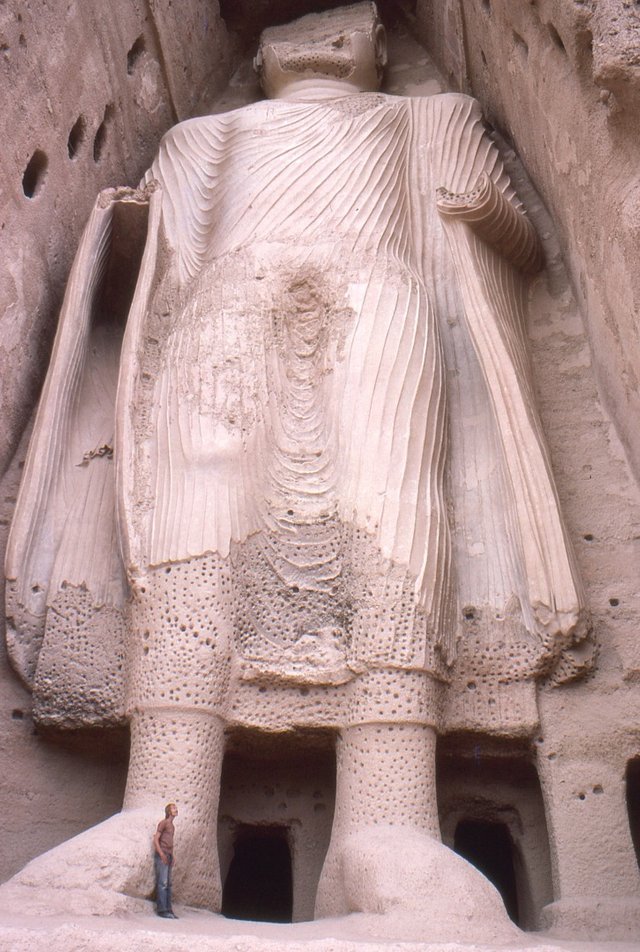A Tale Of Two Transhuman Nations (Part Three)
A TALE OF TWO TRANSHUMAN NATIONS (PART THREE)
(Author’s note: What follows is not a review of Zoltan Istvan’s novel ‘The Transhuman Wager, but rather some thoughts inspired by its plot and the issues it raises. My intended audience are people who have read the book, so I do not intend to give a synopsis of its plot, nor will I shy away from spoilers. This essay was originally published on my blog)

(Image from commons.wikimedia.org)
Both “Transhumanist Wager” and “Manna” arguably contain variations of the Transhumanist Wager. Istvan tells us:
"The wager...states that if you love life, you will safeguard that life, and strive to extend and improve it for as long as possible".
In Manna, the Australia Project has nine core principles, one of which is 'Live your life'. A character explains:
"Live your life means that... you decide what you want to do, and then you are able to do it. You reach your full potential. Live your life is the idea of thinking about your life as a whole, as something you get to design and control".
Thanks to our technological capability, and the problem solving which is the true wealth and success of capitalism, today we have much more control over our lives than our ancestors. When it is dark, we can choose to flood our homes with light. When it is cold we can choose to be warm thanks to heating; and when it is warm air conditioning can keep us cool. But there are still some things that are beyond our control, certain limitations imposed upon us by our biological substrates. For example, we can augment our physical strength with machinery and our mental capabilities with computers, but we cannot choose not to succumb to the ravages of ageing.
(Image from wikimedia commons)
Given the choice, wouldn't just about everybody choose to be alive tomorrow rather than be dead? We might imagine some unfortunate soul who faces such a poor quality of life tomorrow that death now seems like a preferable alternative. The author Terry Pratchett considered it preferable to be euthanized rather than let his incurable alzheimers rob him of his brilliant mind. But what if there were a third option along with 'live in intolerable circumstances or die', that choice being 'have your malfunctioned body or mind repaired, so that it works as good as new'? What person would not go for that option if it were available?
You could try other options, like praying for divine intervention. But, really, how do any alternatives measure up to practical solutions put through the rigours of the scientific process and shown to be effective and replicable? Why pray for a healthy child when genetic engineering can guarantee your offspring will not be burdened with disability? If you have a disability, why would you do anything other than use medical technologies that can fix it, or adopt tech solutions that render that disability irrelevant? Yes, I am aware that some people do choose not to receive medical intervention on religious grounds. But that is not logical.
Transhumanism is logical. The most reasonable thing is to want to live to see tomorrow. And not to merely be alive tomorrow but to feel that your life is progressing in a positive direction. Who, given the opportunity, would opt for less intelligence rather than more? For a disabled body rather than a super-abled one?
But while I feel that Manna really believes in the Transhumanist Wager, funnily enough I do not get that impression from Istvan's novel. Why not? Because residents of the Australia Project have a genuine choice with regards to the extent to which they contribute to and participate in transhumanism. The technologies are made available and, apart from rules designed to prevent behaviour that would overtly interfere with the ability of others to adopt the lifestyle they prefer, they can do what they want. This is a civilization that trusts that the logic of transhumanism coupled with its practical realisation is enough to ensure its success. No other coercion is necessary.
JOIN JETHRO...OR DIE!
When Jethro says, "I believe in...choice", what does he mean, exactly? Well, we find out later:
"The choice we offer is simple: Die or join us. To die is to continue in your meager ways, your lackluster philosophies, and your future material successes, with nothing but gravestones and Internet obituaries to memorialize you at the end of your lives. To join us is to begin the greatest adventure and leap of progress our species has ever known".
Sounds reasonable. Opt in, adopt transhuman life extension and augmentation technologies, and your lifespan will extend indefinitely and your life's potential will expand. Opt out and, well, you will not be around all that long to influence the future.
But Jethro is not really saying 'choose life extension or choose death'. He is saying 'be the kind of transhumanist I approve of, or be killed'. Remember, he said that anybody who does not belong (ie, conforms to his concept of what a transhumanist should be) will be ejected from Transhumania. Bare in mind that Transhumania is intended to evolve into something a bit more large-scale than just an offshore research facility:
"Earth...will be transformed into one global civilization...There will be no more sovereign nations, only Transhumania".
How do you eject undesirables from the planet? Send them off to space colonies? No, Jethro's transhumanist revolution has other plans:
"Any individual who ultimately hampers the optimum transhuman trajectory should be eliminated. The Humanicide Formula addresses this issue directly. It determines whether an individual should live or die based on an algorithm measuring productivity in terms of that individual's remaining life hours, their resource consumption in a finite system, and their past, present and potential future contributions".
This is not transhumanism that I subscribe to. Transhumanism is a movement that advocates, researches, and develops scitech that will give people maximum possible control over their own lives. The emphasis is very much on personal choice. I cannot tell you that you must become a superperson and you cannot tell me that I must relinquish my choice to become a superperson. When you go beyond making the adoption of transhuman technologies, philosophy etc a matter of personal choice and say "you must do this, or we will kill you", what you have is not transhumanism, but rather a form of eugenics. It is imposing your choice on others, making them conform to your conception of a worthwhile life.
THE DANGERS OF UTOPIAN THINKING
(Auschwitz. Image from wikimedia commons)
How did Jethro come to have such a warped concept of transhumanism? I think it is significant that he thinks of Transhumania as being a utopia. The problem with utopian thinking is that it sets up a pernicious utilitarian calculus. Most people accept that, in a situation where you must choose between a course of action that will result in the deaths of few or the deaths of many, the ethical thing to do would be to kill a few. In a utopia, its moral value is infinite because everybody is happy forever. If it is ethically permissible to sacrifice a few for the greater good, how many may be sacrificed to ensure an infinite good? And what about people who stand opposed to your concept of utopia? How evil are these people?
Secondly, everything is there for a reason in a utopia. Such societies by definition conform to a tidy blueprint. But both individuals and groups of people are diverse, and among that diversity will be people who cling to values that are out of place in (your version of) a perfect world. As Steven Pinker wrote, "if you are designing the perfect society on a clean sheet of paper, why not write these eyesores out of the plans from the start?".
For Jethro, it is perhaps neither people or even groups of people who stand in the way of utopia, but rather certain cultural systems which have been carefully manufactured over millennia to condition people away from their naturally transhumanist behaviour.
"It started long ago, with the inception of civilization, when charismatic leaders and ruling clans...learned they could preserve their platforms of power by controlling their communities' thinking and behavioural patterns". Refined over many centuries, that thought control has resulted in religious institutions, State control, and consumerist-fuelling media which "are nothing more than pieces of an intangible psychological construct designed...to keep you producing for others and contributing to their overall gain and not your own".
In Jethro's utilitarian calculus, religious institutions and State power are the infinite evils that stand opposed to his infinitely good Utopia. So, when he says the time has come for such institutions to be "wiped away" you just know he is about to perpetrate some enormously wicked act.
THE TRANSHUMAN TALIBAN
(Image from Pinterest)
In March 2002, the Taliban, on orders from Mullah Mohammed Omar, destroyed two statues of the Buddha, which had been carved into the side of a cliff in Banyan valley, central Afghanistan. Several explanations have been offered to account for this destructive act. Some say they were destroyed in protest to international age exclusively reserved for maintaining those statues at a time when Afghanistan was in the grip of a famine. Others claim the statues were destroyed in accordance with Islamic law.
That latter reason epitomises everything bad about religion. It speaks of intolerance of the beliefs of others, and the need to assert one's own dogma on everybody else, whether they like it or not. But their act of vandalism cannot hold a candle to the act of destruction that Transhumania's military technology unleashes. By the end of the attack we have the obliteration of:
The White House, Capitol Building and Supreme Court.
The Vatican.
The Kaaba.
The Wailing Wall and Temple Mount
The Grand Mosque.
Buckingham Palace.
Notre Dame.
Rio de Janeiro's Christ the Redeemer statue.
China's Imperial Palace.
The Kremlin.
Actually, this is only a partial list. Istvan lists many more famous historical architectural works that are destroyed. What is more, the story tells us "no timeless religious monument (was) left unscathed", suggesting that even buildings not explicitly listed (such as St Paul's Cathedral and the Egyptian Pyramids) are also demolished.
Jethro gives advance warning of his act of wanton destruction, pointing out that "he was not an archaeologist, but a futurist. And relics of the past bore little value to him". Wow. That has to rival 'It's the work of infidels' as the stupidest reason to destroy our ancestor's work ever put forward.
And what could it achieve, really? Surely not the elimination of democracy or communism or religion or any institution Jethro might despise. Those are intangible belief systems. A church and mosque is a community not a building. The physical monuments can remain while the cultural reason for their construction is lost. Nobody really knows why ancient people built Stonehenge. Whatever reason they had is lost to antiquity. Equally, the destruction of monuments is no guarantee that whatever intangible belief systems associated with them will also be eliminated. Joseph Stalin ordered the destruction of churches, mosques and temples but nevertheless religious beliefs and practices persisted among the majority of the population.
All you really guarantee is that you will be demolishing physical representations of human ability, monuments not just to some religious or political ideology that is ridiculous to some, but also monuments to the skills and ingenuity of our ancestors who laid the foundations upon which the modern world is built.
Prior to this act of destruction, Transhumania's cyberwarriors succeed in hacking into the world's nuclear arsenal, and cause the timers to tick ominously down to zero, only for a last moment reprieve from armageddon when Jethro orders the countdown halted at three seconds to spare. In the modern world, just about everything is dependent on computers. So why not have a 'Day The Earth Stood Still' scenario where Transhumania shuts down all essential services? and then takes over global media so that Jethro can deliver a 'this is John Galt speaking' lecture where he lays bare all that is wrong with the world today? Jethro does deliver such a speech and while I do not agree with everything he says, there is much to admire in it. But how reasonable would any speech sound coming from somebody who just acted like the worst fanatic?
CONCLUSION.
If I were to base my opinion of Zoltan Istvan purely on this novel, I would harbour strong suspicions that he was actually an anti-transhumanist. The movement has long struggled to escape from the shadow of eugenics, which it superficially resembles, and here is a story which portrays transhumanists as aggressively intolerant, egocentric and determined to stop at nothing in their mission to mould everybody into their version of a perfect being.
Or, I might think that Istvan was both a transhuman advocate and Ayn Rand admirer who set out to write the science fiction story she would have written were she alive today. But, alas, judged purely on the basis of this story he lacks the sheer intellectual ability of the founder of Objectivism, and the result is a blunt and crude imitation of her novels, where admirably self-interested characters are replaced with contemptibly ego-centric ones. Sure, there are aspects of the story I like. I like the way the story includes people with many different belief systems, providing an opportunity for Socratic questioning, complex ideas covered by many different angles. I did admire Jethro's sheer determination and thought there was a great deal of merit in judging people in terms of what value they have to offer. But, the overriding thought I get from reading Transhumanist Wager is that it portrays transhumanism in a light that provides ammunition for the movement's opponents more than it provides arguments against their criticisms.
REFERENCES
“Transhumanist Wager” By Zoltan Istvan
“Manna” By Marshall Brain
“The Better Angels Of Our Nature” by Steven Pinker



Yes we vote @extie-dasilva and keep posting !!!

This post has been ranked within the top 80 most undervalued posts in the first half of Dec 13. We estimate that this post is undervalued by $6.26 as compared to a scenario in which every voter had an equal say.
See the full rankings and details in The Daily Tribune: Dec 13 - Part I. You can also read about some of our methodology, data analysis and technical details in our initial post.
If you are the author and would prefer not to receive these comments, simply reply "Stop" to this comment.
Very nice explanation and evaluation of zoltan's book👍 I particularly like the comparison with Marshall brain's Manna🤔 one of my favorite utopian scenarios 🎨✍️ and one that I suspect may be able to be implemented in a decentralized way so that everyone might have the ability to "live their life" 🐳🐶🐹🍦 imagine the distribution of value and the power to loan that value to projects you support or to spend that value on your own ideas ✍️🎨🚀 I'd like to work on that 👷♀️🗣️✍️🎨